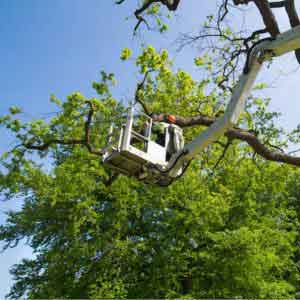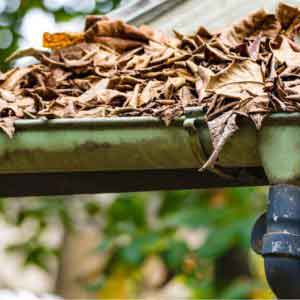It’s that time of year again where extreme weather, namely severe thunderstorms, heavy rain events, and hurricanes, become a concern for millions. Whether your home is in a coastal community, a valley in the mountains, or a suburban neighborhood outside of a major metro area, these types of drastic weather events are unavoidable and often arrive with little to no notice. When preparing for a large storm to roll through your area, it’s important to first focus attention on securing the safety of your family and home. Remember, as much as we love our gardens and landscaping, they will always grow back!
Start a Yearly Schedule
Unless your home is directly near a body of water, most damage that occurs from a severe weather event, namely a hurricane, is from wind. The most susceptible part of a garden to wind isn’t any of the plants or flowers, but rather the trees throughout the property. Take time at the beginning of the year, before new growth begins to develop, to thin out the canopy of any trees, large or small.
Be sure to examine closely for any signs of disease in the trees, both in the upper branches as well as around the roots. Disease in mature trees can greatly increase the chances of a limb or the entire tree coming down in high winds. Waiting until a storm or hurricane is bearing down on your home to trim trees can be a costly endeavor, as well as quite time-consuming when there are other higher priority preparations to be made.

De-Decorate Your Garden
For most of the year, all of the items in the garden are not only aesthetically pleasing, but often serve a purpose in making gardening tasks simpler. Come hurricane season, these same tools, flowerpots, and decorations can quickly become projectiles that strong winds can pick up and fire towards your home. Start by removing any hanging flowerpots, wind chimes, bird feeders, and items hung from fences or posts and store them indoors.
Next, consider moving larger potted plants indoors if they are not too heavy. Otherwise, the best way to help these plants ride out the storm is to lay them and the pot on its side and place a few heavy items around the pot to prevent it from rolling around. As difficult as it may be to accept that your beautiful blooms on bushes, shrubs, or ornamental trees will most likely be blown away, avoid wrapping any plants with tarps or blankets, as they can then turn into a “sail” or “kite” once the wind hits, causing the plant to whip around and potentially snapping the trunk or stem.
Consider Drainage and Potential Blockages
Many severe thunderstorms and hurricanes can deliver rain amounts that easily exceed six inches, often dropping double digit rainfall in a very short amount of time. Anytime an area receives this level of rainfall in such a short period of time, drainage and sewer systems are tested to the extreme. Many causes of homes sustaining water damage after a storm actually aren’t caused by the amount of rain, but rather from drains being clogged by leaves, branches, mulch, and other organic matter. Take a look around your garden area, as well as around the foundation of your home. Note where any drains are located that will be vital to be kept clear to avoid backup and consider taking up mulch in that area. After a period of heavy rain, it’s always a good idea to pull back the mulch on garden beds to allow the soil to dry out and prevent any root rot from developing.

Use Structures to Your Advantage
So long as you are aware of the direction that a storm will be arriving from, which is usually fairly predictable in hurricanes, you can move larger items in your garden, like tables, chairs, coolers, umbrellas, etc. to a side of your house that should be shielded from strong winds. If you have a pool on the property, tie off a rope to your patio furniture and toss ‘em in. They’ll be safe from winds under the water, and the rope will make it easier to retrieve them once the storm has passed.
Have any other tips for riding out hurricanes or other major weather events in the past? Share then with the Eden Brother’s community by leaving a comment below.